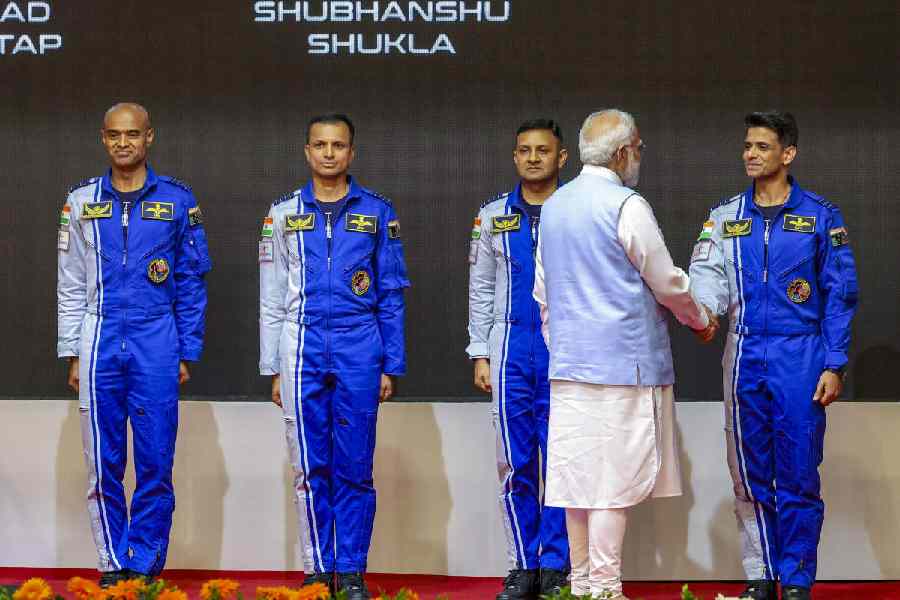Prime Minister Narendra Modi made a historic announcement on Tuesday, revealing the names of the four astronauts who are currently undergoing rigorous training for India's first-ever human space flight mission, Gaganyaan.
Addressing the audience at the Vikram Sarabhai Space Centre (VSSC) at Thumba near here, the Prime Minister introduced to the nation the esteemed astronauts: Group Captains Prasanth Balakrishnan Nair, Angad Pratap, Ajit Krishnan, and Wing Commander Shubhanshu Shukla.
Bestowing them with the prestigious 'astronaut wings,' Modi hailed these astronauts as "four forces" representing the aspirations of India's 1.4 billion people.
He emphasised the significance of this mission, noting that after four decades, an Indian is poised to venture into space.
"This time around, the countdown, the timing, and even the rocket would be ours," Modi declared.
Reflecting on the symbolic importance of the astronauts' mission, PM Modi described them as not merely individuals but as four 'Shakti' carrying the hopes and dreams of 140 crore Indians into space.
Modi revealed the names of the four astronaut-designates in the presence of dignitaries, including Kerala Governor Arif Mohammed Khan, Chief Minister Pinarayi Vijayan, Minister of State for External Affairs V Muraleedharan and ISRO chairman S Somanath.
The PM expressed immense pride that the majority of components for the Gaganyaan mission are manufactured in India, underscoring the nation's self-reliance in space exploration.
PM Modi further extolled the astronauts and asserted that their names have become intertwined with India's success.
He lauded their dedication to training, which included the practice of Yoga, and hailed them as representatives of India's resilient Amrit generation, known for their unwavering determination and ability to overcome challenges.
Modi said that India's space sector's contributions were not only sowing the seeds of scientific temperament among the younger generations, but also providing an impetus for the country to emerge as a global player in the 21st century.
He said that few nations have achieved the feats of reaching Mars in the first attempt, launching more than 100 satellites in a single mission, landing on the south pole of the Moon and the successful insertion of Aditya L1 solar probe in its orbit 15 lakh kilometers from Earth.
"All of you are opening new doors of future possibilities," he told the ISRO team, adding that it was estimated that India’s space economy will grow five-fold and touch 44 billion dollars in next 10 years.
The PM said that India was becoming a global commercial hub in the field of space and in the coming days, it will once again go to the Moon, retrieve samples from there, and by 2035 the country will have its own space station.
"In this Amrit Kaal, an Indian astronaut will land on the Moon in an Indian rocket," he said.
Earlier, Modi inaugurated three major space infrastructure projects worth around Rs 1,800 crores of ISRO during his visit to the VSSC.
The projects include the SLV Integration Facility (PIF) at the Satish Dhawan Space Centre, Sriharikota, the new 'Semi-cryogenics Integrated Engine and Stage Test facility' at ISRO Propulsion Complex at Mahendragiri and ‘Trisonic Wind Tunnel’ at VSSC, Thiruvananthapuram.
The Trisonic Wind Tunnel at VSSC produces controlled uniform airflow over scaled models of rockets and aircraft to evaluate their aerodynamic characteristics and designs. It features a test section size of 1.2 meters and can generate speeds ranging from subsonic to supersonic, up to 4 times the speed of sound (Mach number 4.0).
The Mahendragiri unit is a state-of-the-art facility capable of handling large flows of propellants. It stands 51 meters tall and has a flame deflector depth of 30 meters.
The PSLV Integration Facilities at Sriharikota were developed to increase launch frequency from the First Launch Pad (FLP) and include Integration Building, Service Building, Rail Track, and associated systems.
In his speech on the occasion, the PM also emphasised upon the "important role" played by women in the country's space programme.
"Whether it is Chandrayaan or the Gaganyaan, no such project can be imagined without women scientists," he said and pointed out that more than 500 women were in leadership positions in the ISRO.
He also recalled his statement about the beginning of a new 'kaal chakra' made during the Ram Temple consecration in Ayodhya and said that India was continuously expanding its space in the global order and its glimpses can be seen in the country’s space program.
Referring to India's achievement of becoming the first nation to land on the Moon's south pole, the PM said, "Today Shiv-Shakti Point is introducing the entire world to Indian prowess." He also drew comparisons between India’s achievements in the space sector in the last 10 years with that of the decade before 2014 and said that the nation was launching around 400 satellites recently, compared to only 33 back then.
"There is a growth in the number of youth-driven space startups to more than 200 from two or three," he added.
The PM said that the various reforms, like the FDI policy of 100 per cent foreign investment in the space sector, have provided an impetus to the growth of that area as now the world's biggest space institutes can establish themselves in India and provide an opportunity for the youth to showcase their skills.
Pointing to India's resolution to become Viksit, Modi said space science was not just about rockets, but was also the biggest social science.
"Society benefits the most from space technology." he said.
The PM said agriculture, weather-related calamity warning, irrigation, navigation maps, the NAVIC system for fishermen, border safety, education, health etc were all areas to which space science has made huge contributions.
Modi also took a walkthrough of the exhibition of the various ISRO projects showcased at VSSC.
Vijayan too spoke at the event where he said that Kerala was privileged to aid in the country's development, especially in aerospace research.
Except for the headline, this story has not been edited by The Telegraph Online staff and has been published from a syndicated feed.










